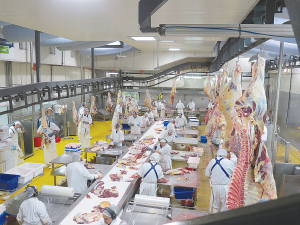NZ's red meat sector says it is committed to playing its part to address climate change, improving our waterways and protecting New Zealand's biodiversity. However, it wants a future Government to implement these policies in relation to the environment and climate change. Nathan Guy, Meat Industry Association, and Kate Acland, Beef+Lamb NZ explain.
OPINION: New Zealand sheep and beef farming is built around extensive low-impact grassland grazing systems.
We are widely recognised as having one of the most environmentally efficient farming systems in the world. The carbon footprint of New Zealand beef and lamb from farm to plate is amongst the lowest in the world.
While the sector is up for the challenge of doing even better, we are asking for some specific changes to policies as the cumulative economic impact of the current poorly crafted rules is crippling.
Climate Change:
- For the Government to report annually on new warming as well as emissions.
- Amend the methane targets to ensure they are aligned with carbon dioxide emissions reductions to achieve no additional warming by 2050.
- Establishing a robust measurement and reporting framework for agricultural emissions, which sets common standards across sectors ensuring practical and cost-effective reporting.
- No pricing of emissions unless there is an identified need and benefit for reducing emissions if our sector is tracking to meet current targets – there is therefore no justification for pricing.
- Recognise and reward farmers for their on-farm sequestration.
- Continue to support industry through investment in climate change mitigation and adaptation research funding.
- Continue to support the processing sector transition away from coal to renewable energy.
Carbon Farming:
- A combination of policy changes are needed to curb the sale of sheep and beef farms into forestry to offset carbon emissions.
- There needs to be an urgent review of the role of forestry in the Emissions Trading Scheme and specific limits on the amount of offsetting fossil fuel emitters can do. We are not saying zero, but some limits are warranted.
- In the short-term, we must test and implement a range of possible tools such as further limits on foreign investment; some limits on exotics being put into the permanent category of the ETS (to address "carbon only" farming); and additional rules for carbon and plantation forestry at the regional level.
Biodiversity:
- Delay the introduction of the Biodiversity National Policy Statement until the policy settings are right and the final NPSIB supports and encourages good biosecurity outcomes, not additional unnecessary regulation. Policies should ensure that biodiversity is an asset rather than a liability.
- In particular, work with industry to narrow the definition of Significant Natural Areas (SNAs) and provide greater support and recognition for farmers for protecting indigenous biodiversity.
Water:
- Remove the low slope map for stock exclusion and replace it with a more effective general rule designed to accommodate regional differences.
- Defer the introduction of the winter grazing rules until the Government has operationalised freshwater farm plans and amend the slope rule for winter grazing from 10 degrees to 15 degrees.
- Change the thresholds for requiring a freshwater farm plan to ensure the plans are risk and outcomes-based.



















